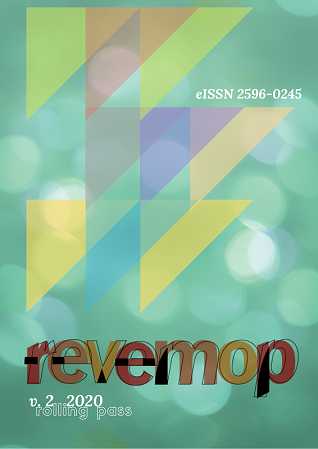Connecting Ethnomathematics and Modelling: a mixed methods study to understand the dialogic approach of Ethnomodelling
Abstract
This research on ethnomodelling was conducted in both a state public school and in a local farmers’ market in a metropolitan region of Belo Horizonte, Minas Gerais, in Brazil. The main objective of this study was to identify how dialogic approaches of ethnomodelling could contribute to the process of re-signification of function concepts learned by 38 students in the second year of high school during their interaction with a local farmer and his labor practices. Another objective was to understand the importance of cultural conceptions and elaboration of ethnomodels extracted from the mathematical practices developed by this farmer for use as a pedagogical action in the classrooms. For the data collection, three blocks of activities were used, two questionnaires (initial and final), a semi-structured interview with the farmer, a seminar with students and the farmer, and the teacher-researcher fieldnotes. The collected data, both of a quantitative and qualitative nature, were analyzed simultaneously with the use of the Mixed Method Study through a QUAN + QUAL design. After this analysis, qualitative data were quantified in order to enable the interpretation of the results through the elaboration of three categories School Environment, Out-of-School Environment and Dialogical Environment. The results of this study show that ethnomodelling provides an integrative approach to school mathematics curriculum by considering both the emic and etic mathematical knowledge through the development of a dialogic approach that shows the relevance of its cultural dynamism.
Downloads
References
ALVES, Gelindo Martineli. As contribuições da Etnomatemática e da perspectiva sociocultural da história da Matemática para a formação da cidadania dos alunos de uma turma do 8.º ano do Ensino Fundamental por meio do ensino e aprendizagem de conteúdos da Educação Financeira. 2014. 357f. Dissertação (Mestrado em Educação Matemática) — Departamento de Matemática. Universidade Federal de Ouro Preto. Ouro Preto.
BANKS, James A. Educating citizens in a multicultural society. New York: Teachers College Press, 1997.
BASSANEZI, Rodney Carlos. Ensino-aprendizagem com Modelagem Matemática. São Paulo: Contexto, 2002.
CORTES, Diego Pereira de Oliveira. Etnomodelos como uma ação pedagógica: sugestões para a prática docente em sala de aula. Produto Educacional (Mestrado em Educação Matemática) 2017b. (Mestrado em Educação Matemática) — Departamento de Educação Matemática. Universidade Federal de Ouro Preto. Ouro Preto.
CORTES, Diego Pereira de Oliveira. Re-significando os conceitos de função: um Estudo Misto para entender as contribuições da abordagem dialógica da Etnomodelagem. 2017b. 226f. (Mestrado em Educação Matemática) — Departamento de Educação Matemática. Universidade Federal de Ouro Preto. Ouro Preto.
CRESWELL, John W.; CLARK, Vicki L Plano. Designing and conducting mixed-methods research. Thousand Oaks: Sage Publication, 2007.
D’AMBROSIO, U. Etnomatemática e Educação. In: KNIJNIK, Gelsa; OLIVEIRA, Claudio José; WANDERER, Fernanda. (Org.). Etnomatemática: currículo e formação de professores. Santa Cruz do Sul: EDUNISC, 2005, p. 39-52.
D’AMBROSIO, Ubiratan. Etnomatemática, justiça social e sustentabilidade. Estudos Avançados, São Paulo, v. 32, n. 94, p. 189-2014, set./dez. 2018.
D’AMBROSIO, Ubiratan. Etnomatemática: elo entre as tradições e a modernidade. Belo Horizonte: Autêntica, 2001.
D’AMBROSIO, Ubiratan. Etnomatemática: um programa. Educação Matemática em Revista, v. 1, p. 5-11, 1993.
D’AMBROSIO, Ubiratan. O Programa Etnomatemática: uma síntese. Acta Scientiae, Canoas, v. 10, n, 1, p. 7-16, jan./jun. 2008.
D’AMBROSIO, Ubiratan. Que Matemática deve ser aprendida nas escolas hoje? Teleconferência no programa PEC. Formação Universitária. São Paulo. SP: Secretaria de Educação do Estado São Paulo, 2002.
DWYER, Kevin. Moroccan dialogues: anthropology in question. London: J. Hopkins Press, 1982.
GEERTZ, Clifford. (Ed). The interpretation of culture: selected essays. New York: Basic Books, 1973.
LETT, James. Emic-etic distinctions. In: LEVINSON, David; EMBER, Melvin. (Ed.). Encyclopedia of cultural anthropology. New York: Henry Holt and Company, 1996, p. 382-383.
NICOLESCU, Basarab. O manifesto da transdisciplinaridade. Tradução de Lúcia Pereira de Souza. São Paulo: Triom, 1999.
OREY, Daniel Clark. What I want to be when I grow up. TEDx Sacramento. Sacramento, CA: TEDx, 2013. Available in: https://www.youtube.com/watch?feature=player_embedded&v=anZNPNEgmUs#at=36. Accessed in: September 21st, 2019.
OREY, Daniel Clark; ROSA, Milton. A dimensão crítica da Modelagem Matemática: ensinando para a eficiência sociocrítica. Horizontes, Itatiba, v. 25, n. 2, p. 197-206, 2007.
ROAZZI, Antonio. Pesquisa e contexto: métodos de investigação e diferenças sócio-culturais em questão. Cadernos de Pesquisa, São Paulo, v. 62, p. 35-44, 1987.
ROSA, Milton; OREY, Daniel Clark. Abordagens atuais do programa etnomatemática: delineando um caminho para a ação pedagógica. Bolema, Rio Claro, v. 19, n. 26, p. 19-48, jul./dez. 2006.
ROSA, Milton; OREY, Daniel Clark. Alho e sal: Etnomatemática com Modelagem. Perspectivas da Educação Matemática, Campo Grande, v. 2, n. 4, p. 149-162, jul./dez. 2010.
ROSA, Milton; OREY, Daniel Clark. Etnomodelagem: a arte de traduzir práticas matemáticas locais. São Paulo: Livraria da Física, 2017.
ROSA, Milton; OREY, Daniel Clark. O campo de pesquisa em Etnomodelagem: as abordagens êmica, ética e dialética. Educação e Pesquisa, São Paulo, v. 38, n. 4, p. 865-879, out./dez. 2012a.
ROSA, Milton; OREY, Daniel Clark. The Mathematics of the curves on the wall of the Colégio Arquidiocesano and its mathematical models: a case for ethnomodeling. Journal of Mathematical Modelling and Application, Blumenau, v. 1, n. 8, p. 42-62, 2012b.
ROSA, Milton; OREY, Daniel Clark. Vinho e queijo: Etnomatemática e Modelagem! Bolema, Rio Claro, v. 16, n. 20, p. 1-16, jul./dez. 2003.
SAMOVAR, Larry A.; PORTER, Richard E.; McDANIEL, Edwion R.; ROY, Carolyn Sexton. (Ed.). Communication between cultures. Beijing: Foreign Language Teaching and Research Press, 2000.






























